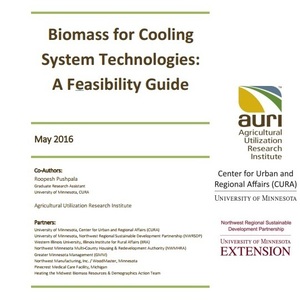Feasibility guide on biomass cooling released




Agricultural Utilization Research Institute
June 30, 2016
BY Erin Krueger
The Agricultural Utilization Research Institute has announced the availability of a new feasibility study that shows biomass cooling can be a viable option for small-to-medium sized commercial, industrial and residential units.
The study explains that increasing temperatures—particularly in the Midwest—are expected to lead to large energy cost increases due to expenditures associated with switching from heating demand to cooling demand over the next five to 25 years. While biomass cooling technologies currently exist, the study indicates they are currently deployed only on a large commercial scale. However, biomass cooling may be an attractive option for smaller-scale installations. The study notes current economic data “substantiates biomass cooling is a viable option and worth consideration, particularly if constructing a new building or retrofitting a current system where piping is in place.”
“In considering operational concerns, case study evidence supports similarities of operations and maintenance for absorptive chiller and conventional technologies,” said the authors in the report. “While it may require a person on staff to monitor the systems, the long-term benefits of job creation, energy savings and increased employment in the biomass sector over time outweigh the operational demands. Additionally, biomass-derived cooling innovations will continue to bring added benefits.”
Advertisement
Advertisement
Within the report, the authors provide a description of how biomass cooling works. They explain the air conditioning units run on energy generated by burning biomass. An absorption chiller generates the air cooling effect from the heat generated by the biomass. Cooled air circulates into different parts of the facility through insulated pipelines. Biomass cooling systems are a potential replacement for conventional air conditioning systems that consume significant amounts of electricity or natural gas.
The report concludes that biomass offers a competitive, and often lower cost, alternative to traditional energy sources. When compared to conventional electricity, the use of wood pellets was found to result in a cost savings of $63.22 per month, with a cost savings of $64.12 per month when compared to propane. Other agricultural biomass sources, such as corn cobs, could provide similar cost savings.
Advertisement
Advertisement
According to Project Manager Becky Philipp, "this project ties in to the AURI mission as it provides a potential added benefit for biomass thermal system installations that could ultimately result in expanded market opportunities for biomass and the biomass industry in Minnesota and beyond." Philipp went on to say that while the economics may not work for all types of biomass fuel at a given time, the information provided in the report facilitates forward thinking and future planning for when the economics do prove feasible. The report identifies technologies that present opportunities for other potential add-on benefits when employing or looking to employ biomass for heating, which makes the investment even more attractive.
AURI Senior Associate Scientist Alan Doering expanded on the economic aspect by saying, "availability and transportation costs will dictate the most economic biomass fuel sources. Utilizing a renewable biomass fuel over conventional or petroleum based fuels can reduce negative impacts on the environment, provide energy security, as well as develop new job creation within communities."
Feasibility report partners include University of Minnesota Center for Urban and Regional Affairs, University of Minnesota Northwest Regional Sustainable Development Partnership, Western Illinois University Illinois Institute for Rural Affairs, Northwest Minnesota Multi-County Housing and Redevelopment Authority, Greater Minnesota Management, Northwest Manufacturing Inc., Pinecrest Medical Care Facility, Heating the Midwest Biomass Resources and Demographics Action Team.
A full copy of the report can be downloaded from the AURI website.
Upcoming Events





